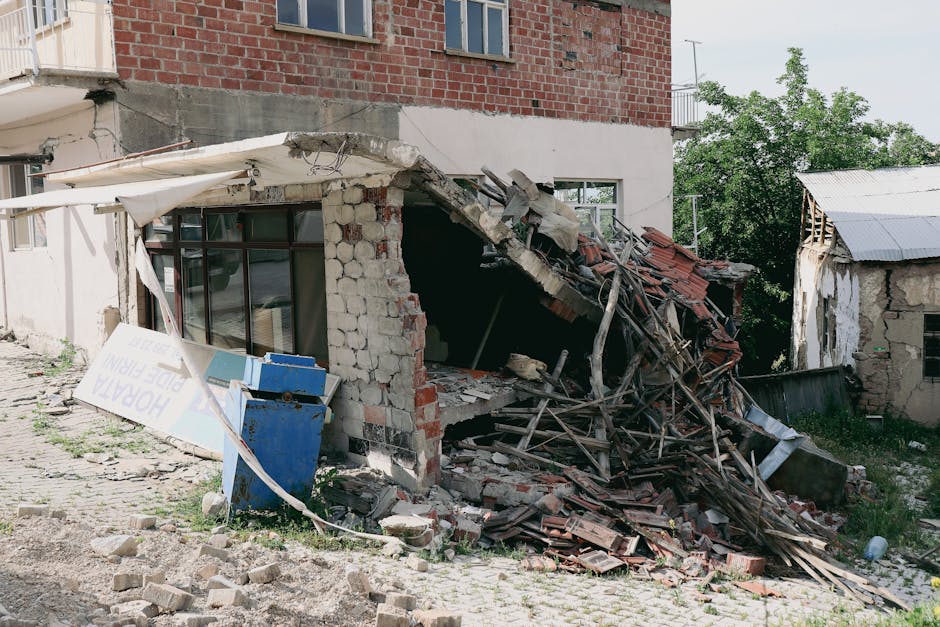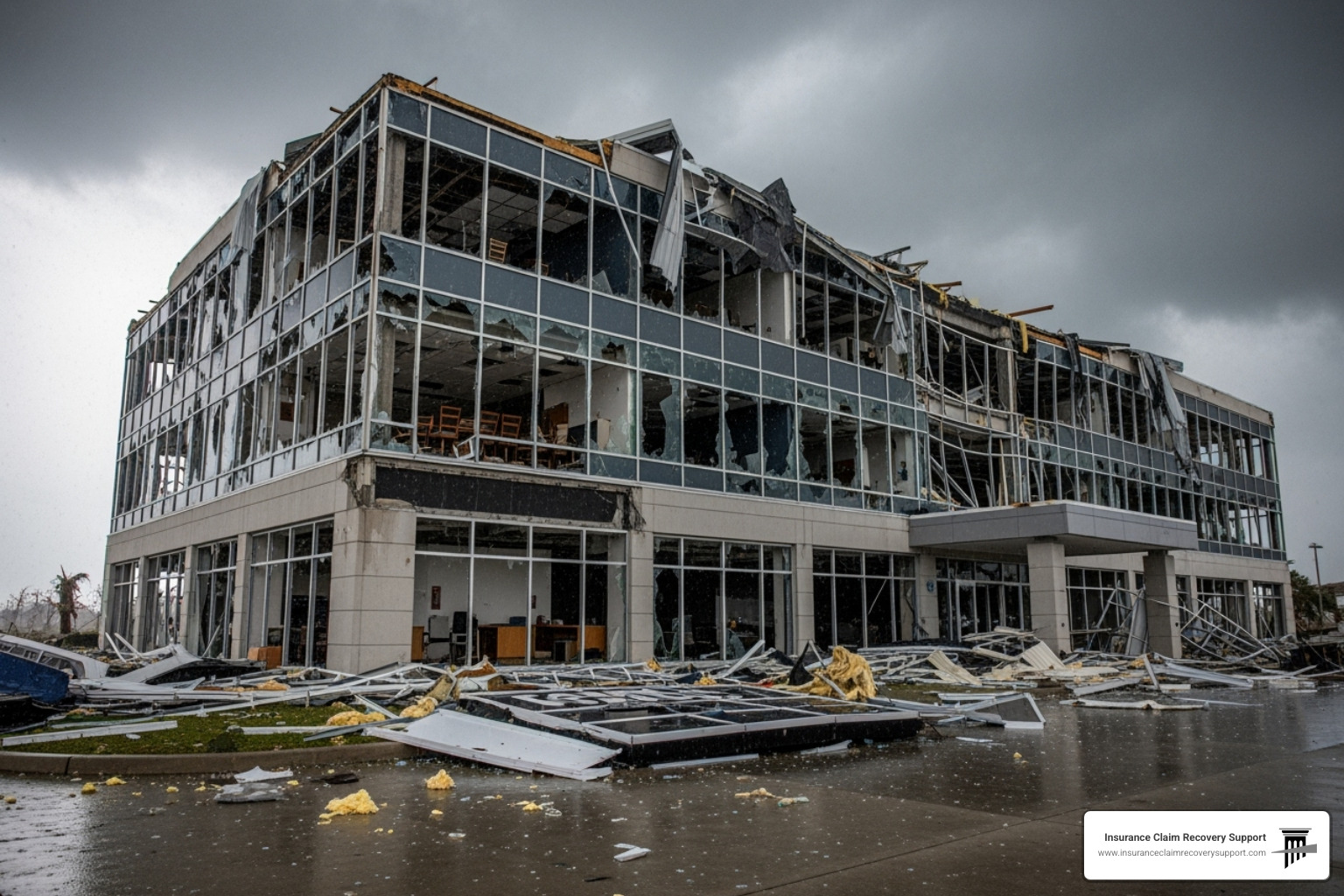Property damage legal support is an essential service for those facing the aftermath of disasters like fires, floods, or storms. Whether you’re dealing with an insurance claim denial or seeking a fair settlement, having expert legal support is crucial. Here are some key points to understand:
- Documentation: Gather evidence with photos, repair estimates, and receipts.
- Understand Policies: Know what’s covered and any exclusions.
- Seek Expertise: Consider legal advice if disputes arise.
I’m Scott Friedson, with experience in property damage legal support. Over my career, I’ve successfully overturned denied claims and negotiated substantial settlements, benefiting countless policyholders.
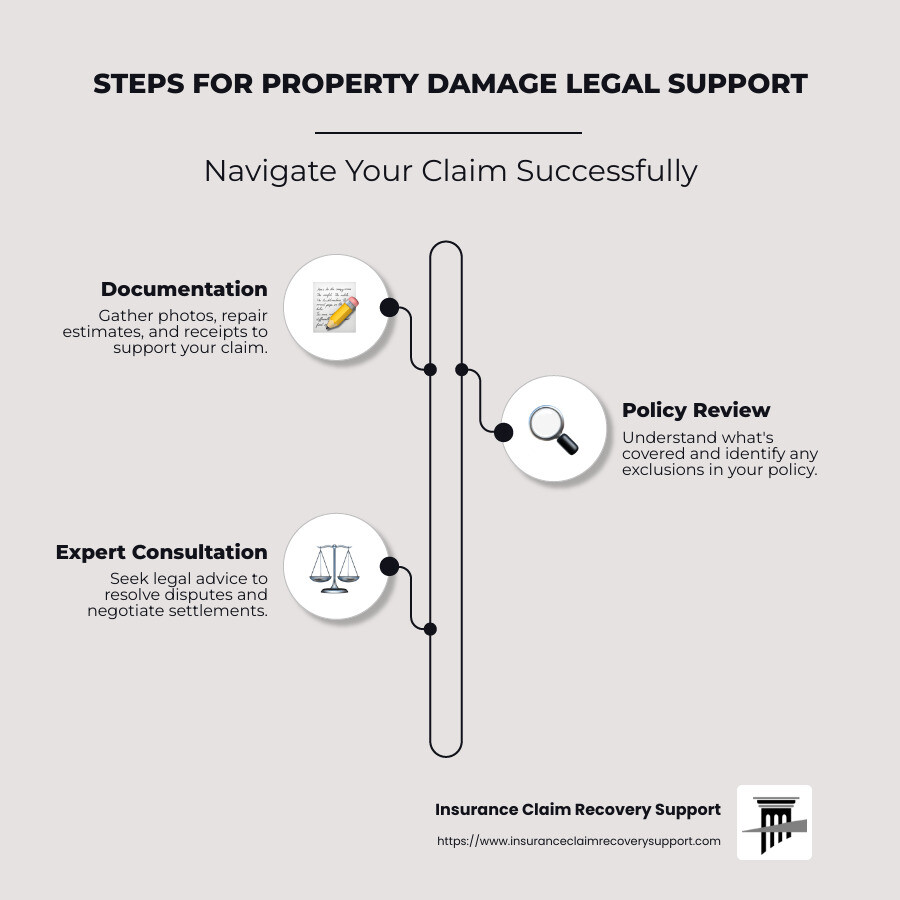
What is Property Damage?
Property damage refers to harm caused to your belongings or land. It can affect different types of property, including:
-
Real Property: This includes land and anything attached to it, like buildings or homes. For example, if a storm damages your house in Dallas, Texas, that’s damage to real property.
-
Personal Property: These are movable items you own, like furniture, electronics, and clothing. If a fire destroys your couch or a thief steals your laptop, these are examples of personal property damage.
-
Tangible Property: This term covers both real and personal property but emphasizes the physical nature of the items. If a car accident damages your fence, that’s damage to tangible property.
Understanding these categories is important for insurance claims. Each type of property may have different coverage terms in your policy. For instance, while your homeowners insurance might cover real property damage from a storm, you may need separate coverage for personal property like jewelry or electronics.
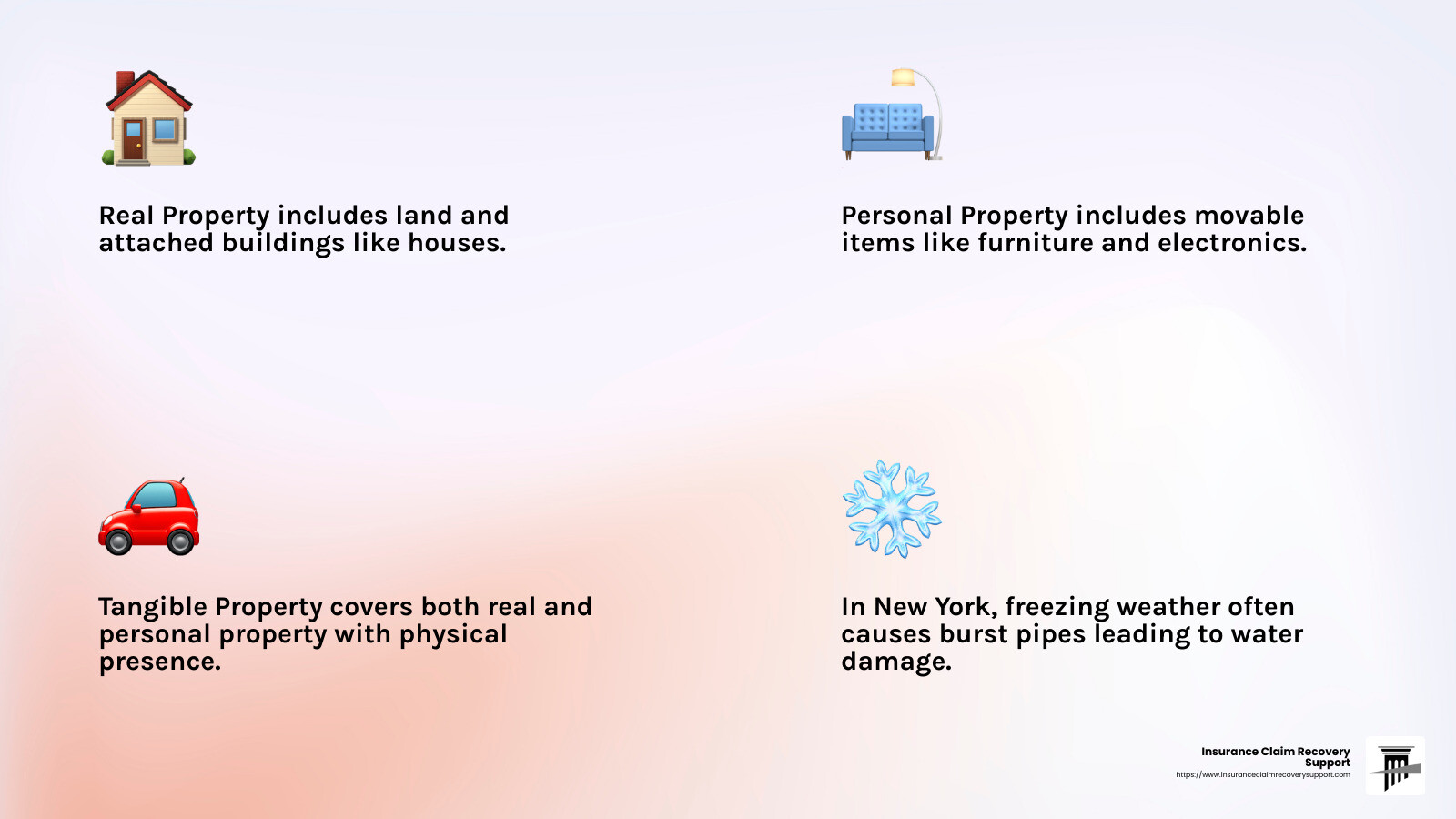
In New York, freezing weather often leads to burst pipes, causing significant water damage to both real and personal property. Knowing the differences between these property types helps in assessing what your insurance covers and what kind of legal support you might need.
If you’re dealing with property damage, remember these key points:
-
Check Your Coverage: Not all policies cover every type of property damage. For example, flood damage might require additional coverage.
-
Document Everything: Take photos, keep receipts, and make a detailed list of damaged items.
-
Seek Legal Help When Needed: If your claim is denied or you’re offered a low settlement, consider consulting a property damage lawyer.
Understanding these basics can help you steer the complex world of property damage claims more effectively.
Types of Property Damage Claims
Property damage can happen for many reasons, and knowing what caused the damage is key to handling claims effectively. Let’s explore the common causes:
Natural Disasters
Natural disasters like hurricanes, earthquakes, and storms can cause severe damage to property. For instance, in Texas, hurricanes often lead to high winds and flooding, which can damage both homes and businesses. Similarly, in New York, freezing weather can cause pipes to burst, leading to significant water damage.
Most insurance policies cover natural disasters, but it’s important to check your policy details. Sometimes, specific events like earthquakes or floods require additional coverage.
Human Error
Sometimes, accidents happen. A contractor might make a mistake during repairs, or a neighbor might accidentally damage your fence. These incidents, while seemingly minor, can lead to costly repairs. In fact, one in 20 insured homes reports a claim each year due to such human errors.
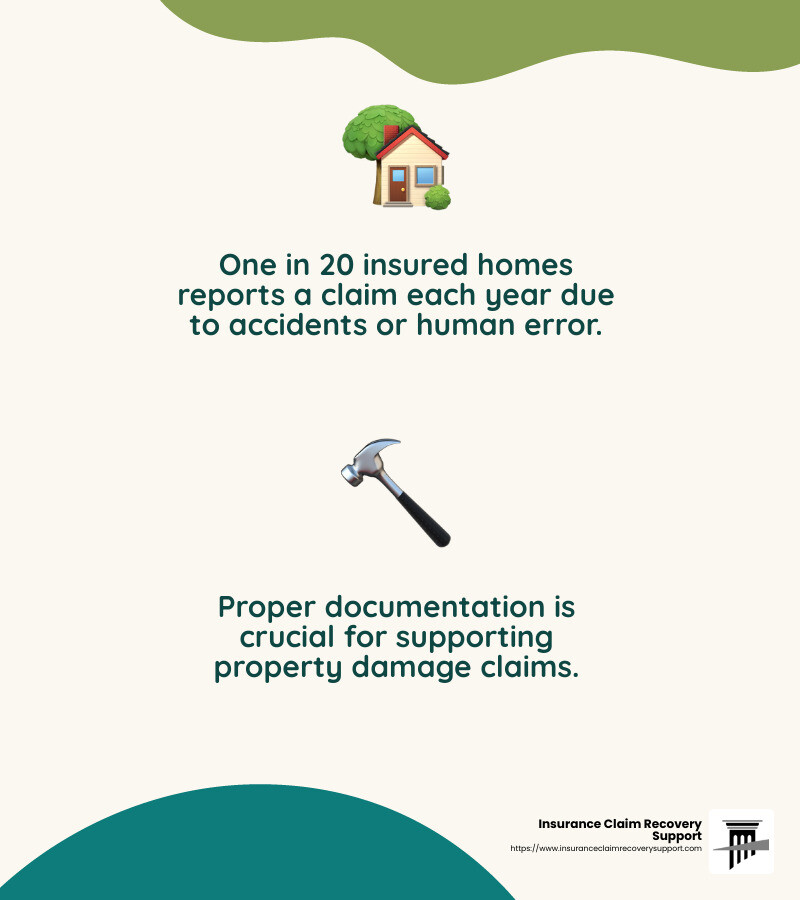
It’s crucial to have proper documentation and evidence, like photos and repair estimates, ready to support your claim.
Construction Defects
Faulty construction can lead to severe property damage. Issues like foundation cracks or poor workmanship can cause long-term problems. If a contractor’s negligence is the cause, they may be held liable. For example, if substandard materials result in a roof collapse, the construction company could be responsible for repairs.
Having a detailed inspection report can help identify these defects early and strengthen your claim.
Vandalism
Vandalism involves intentional damage to property, such as graffiti or broken windows. Both homeowners and businesses can be affected. Installing security systems can deter vandals and help in documenting the act if it occurs.
Most insurance policies cover vandalism, but it’s wise to confirm the specifics with your provider. Filing a police report is also crucial for supporting your insurance claim.
Understanding these common causes of property damage is essential for prevention and recovery. Knowing what your insurance covers and when to seek property damage legal support can make a significant difference when navigating claims and legal responsibilities.
Next, we’ll explore how to steer insurance policies, including understanding exclusions and different coverage types.
Navigating Insurance Policies
Understanding your insurance policy is like reading a map. It guides you through what is covered and what is not. Let’s break it down.
Exclusions
Insurance policies often have exclusions. These are specific situations or types of damage that are not covered. For example, flood damage is a common exclusion in standard policies. If you live in a flood-prone area, you might need a separate flood insurance policy.
Similarly, earthquake damage is usually not covered unless you add it as an extra. Knowing these exclusions helps you avoid surprises when you file a claim. Always read the fine print and ask your insurer about any exclusions that might affect you.
Replacement Cost vs. Actual Cash Value
When it comes to compensation, two key terms are important: replacement cost and actual cash value.
-
Replacement cost means the insurer pays what it costs to replace the damaged item with a new one. If your TV is damaged in a storm, this type of policy would cover the cost of a new TV.
-
Actual cash value is different. It considers depreciation, meaning you get what the item is worth at the time of loss, not what you paid for it. So, if your 5-year-old TV is damaged, you only get the value of a 5-year-old TV.
Understanding these terms helps you figure out how much you can expect to receive from a claim.
Why It Matters
Knowing these details is crucial. It affects how much money you get after a loss and what kind of coverage you need to buy. For example, Eric B. from Texas learned this the hard way. After a storm, his insurance covered his roof repairs, but he had to pay a $2,000 deductible out of pocket.
Always review your policy and consider speaking with a professional if you’re unsure about the details. This preparation can save you time and money when disaster strikes.
Next, we’ll discuss when to seek property damage legal support and how it can help you steer tricky insurance disputes.
When to Seek Property Damage Legal Support
Dealing with property damage can be stressful. Knowing when to seek property damage legal support can make a big difference. Let’s explore some situations where legal help is crucial.
Insurance Disputes
Insurance disputes happen when your insurer disagrees with your claim. Maybe they offer a low settlement or deny your claim altogether. Imagine your house suffers hail damage, but your insurer insists it’s normal wear and tear. This is where legal support steps in. A property damage lawyer can review your policy, gather evidence, and fight for a fair settlement.
Denied Claims
A denied claim doesn’t mean the end. Sometimes, claims get denied due to missing documents or misunderstood policy terms. For example, Sarah from Florida had her flood damage claim denied because her insurer said she didn’t have coverage. With legal help, she proved her policy did include flood coverage, and she received her rightful compensation.
Legal Deadlines
Every state has a statute of limitations for filing property damage claims. In Florida, for instance, you generally have four years to file. Missing this deadline means losing your right to seek compensation. Legal support ensures you meet all deadlines and file your claim correctly.
In summary, if you’re facing an insurance dispute, a denied claim, or unsure about legal deadlines, seeking property damage legal support is wise. Up next, we’ll dive into how this support can help with claim evaluation, policy review, and more.
How Property Damage Legal Support Can Help
When you’re dealing with property damage, having the right legal support can make all the difference. Let’s break down how property damage legal support can assist you through claim evaluation, policy review, negotiation, and even litigation.
Claim Evaluation
First up is claim evaluation. A property damage lawyer will assess your situation to determine the strength of your claim. They will look at the extent of the damage, review your insurance policy, and gather any necessary evidence. This evaluation helps to identify the potential compensation you could receive. For example, if your home suffers from a fallen tree, a lawyer can help ensure that all related damages are included in your claim.
Policy Review
Insurance policies can be confusing, with lots of fine print and exclusions. A lawyer will review your policy to understand what is covered and what isn’t. This ensures that you are fully aware of your rights and can avoid any unpleasant surprises. For instance, if your policy covers mold damage, but the insurance company says it doesn’t, a lawyer can clarify the terms and advocate for your rightful coverage.
Negotiation
Negotiation is a key part of the claims process. Insurance companies often try to settle claims for less than they are worth. A skilled lawyer can negotiate with the insurer on your behalf to secure a fair settlement. They know the tactics insurers use and can counter them effectively. Imagine you receive a low-ball offer for fire damage; a lawyer can push back and fight for the compensation you deserve.
Litigation
Sometimes, negotiations don’t lead to a satisfactory outcome. When this happens, litigation might be necessary. If your claim is denied or underpaid, a property damage lawyer can take your case to court. They will present evidence, argue your case, and aim to get you the compensation you are owed. Litigation might sound daunting, but with expert legal support, you have a better chance of success.
In short, property damage legal support covers all bases—from evaluating your claim to representing you in court. Up next, we’ll tackle frequently asked questions about property damage legal support, including the types of lawyers who handle these cases and how much they might cost.
Frequently Asked Questions about Property Damage Legal Support
What type of lawyer handles property damage?
When it comes to property damage, you might wonder who to call. There are two main types of lawyers who can help: personal injury lawyers and property damage lawyers.
Personal Injury Lawyers: These lawyers often tackle cases where property damage and personal injury occur together. For instance, if you were in a car accident that damaged your vehicle and caused injury, a personal injury lawyer is equipped to handle both aspects. They can negotiate with insurance companies and file lawsuits if needed.
Property Damage Lawyers: These specialists focus solely on property damage issues. Whether it’s fire, water damage, or vandalism, they know the ins and outs of property laws. They can help with everything from reviewing insurance policies to litigating disputes.
How much does a property damage lawyer cost?
Most property damage lawyers work on a contingency fee basis. This means they only get paid if you win your case. Typically, the fee ranges from 25% to 40% of the amount recovered. The complexity of your case often determines the exact percentage.
This arrangement can be beneficial because it aligns the lawyer’s interests with yours—they are motivated to secure the best possible outcome. However, it’s crucial to discuss and understand the fee structure before hiring a lawyer to avoid any surprises.
What is the statute of limitations for property damage claims?
Legal deadlines are critical in property damage cases. The statute of limitations is the time frame you have to file a claim. Missing this deadline usually means you lose your right to seek compensation.
For example, in Maryland, you have three years from the date you became aware of the damage to file a lawsuit. In Florida, the limit is generally four years. These timelines can vary based on the type of damage and local laws.
It’s essential to act promptly. Delaying could mean losing valuable evidence or missing your chance to file a claim altogether. Always check the specific deadlines in your state to ensure you don’t miss out on your legal rights.
Conclusion
When it comes to property damage legal support, Insurance Claim Recovery Support is your dedicated ally. We pride ourselves on being staunch advocates for policyholders, ensuring that you receive the maximum settlement you deserve.
Policyholder Advocacy is at the heart of what we do. Property damage can be overwhelming, both emotionally and financially. Our team stands by your side, guiding you through every step of the claims process. We help you understand your rights and options, ensuring you’re never left to steer the complex world of insurance claims alone.
Our commitment to maximizing settlements is unwavering. We know the tactics insurance companies use to minimize payouts, and we’re here to counter them. With meticulous documentation and skilled negotiation, we work tirelessly to ensure no detail is overlooked and you receive the full compensation you’re entitled to.
Based in Texas, we serve clients across the nation, including major cities like Austin, Dallas, Fort Worth, San Antonio, and Houston. Our experience with various types of property damage claims, from fire and flood to hurricanes and tornadoes, equips us to handle the unique challenges each case presents.
At Insurance Claim Recovery Support, we’re more than just a service provider. We’re your partner in recovery, helping you rebuild and move forward with confidence. If you’re facing a property damage claim, trust us to be your advocate and guide through the storm.

